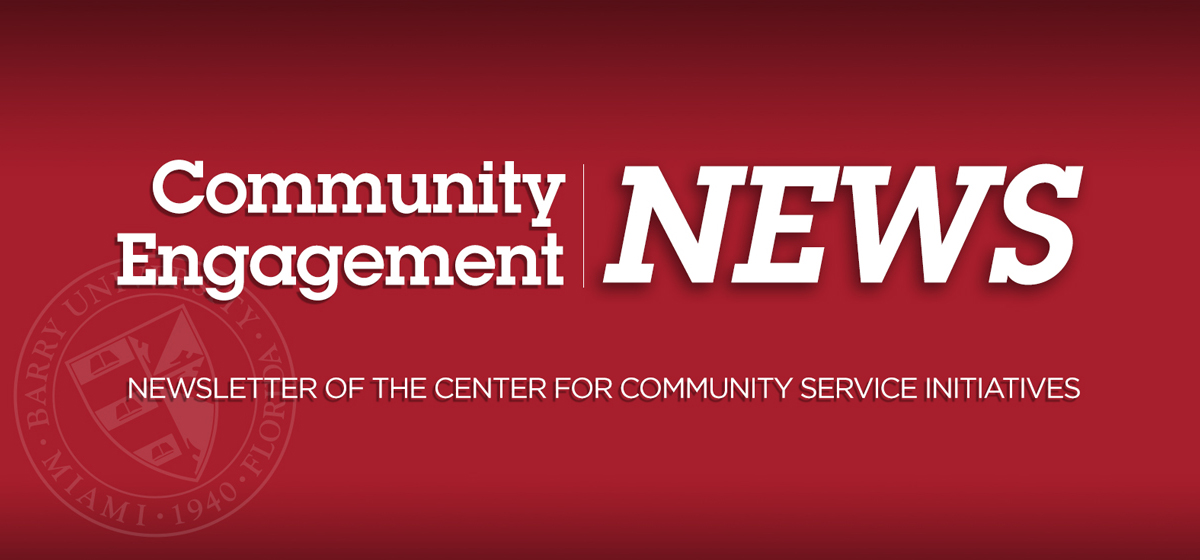June 28, 2021
IN THIS ISSUE
- Community Engagement Initiatives Will Emphasize Student Success and Community Impact
- Twenty-six Faculty Members Have Won Barry Awards for Community Engagement
- Available Community Engagement Resources Include Literature on Experiential Learning
Community Engagement Initiatives Will Emphasize Student Success And Community Impact
Ccsi Preparing Strategic Plan For 2021–2016
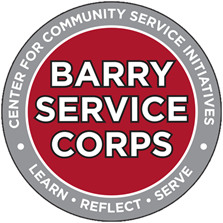
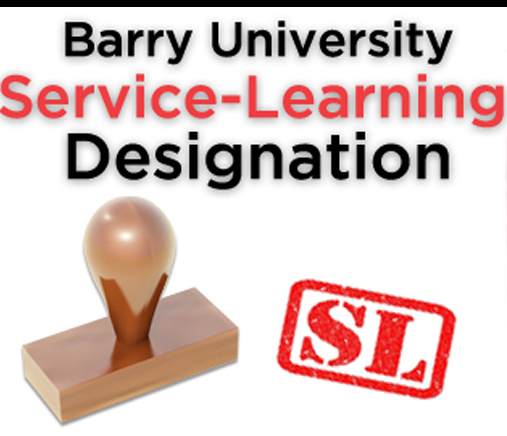
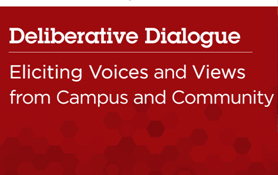
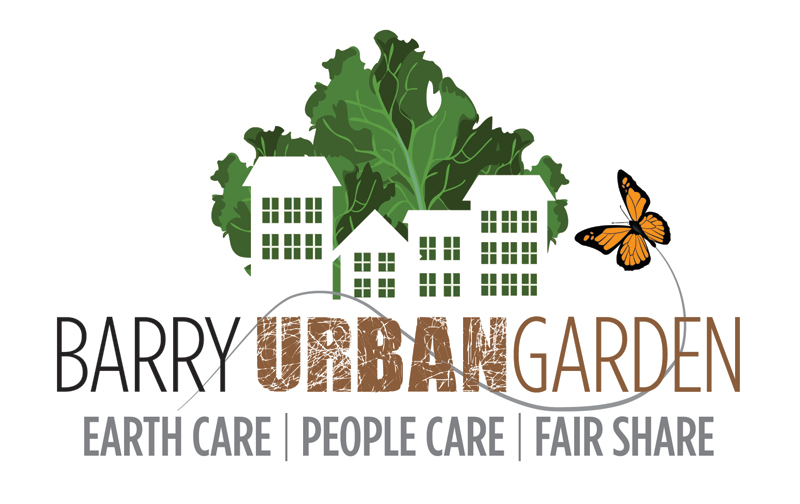
The Barry Service Corps will be enhanced as the centerpiece of student civic learning and leadership development, and service-learning course reviews will be a key element of the new strategic plan. The Deliberative Dialogue Series will remain a major co-curricular event and the Barry Urban Garden will be expanded.
Barry’s community engagement initiatives over the next five years will emphasize student success and community impact. Programs will be designed to support student persistence and achievement while contributing measurably to community improvement.
The Center for Community Service Initiatives (CCSI) is working on the 2021–2026 Strategic Plan for Community Engagement. The plan will keep signature programs and events in place while incorporating special projects in support of the university’s strategic enrollment and student retention goals.
Service-learning course reviews will be a key element of the new strategic plan. Courses will be reviewed to promote quality improvement and to identify exemplars for faculty and students. In addition, global service-learning based on a study-away model will be instituted.
The Barry Service Corps will be enhanced as the centerpiece of student civic learning and leadership development. The program, which encompasses Federal Work-Study Community Service, will provide authentic learning experiences that prepare students for productive employment and engaged citizenship.
Also, the Campus Democracy Project will continue to facilitate democratic engagement. And the Deliberative Dialogue Series will remain a major co-curricular event focused sharply on social justice issues.
Other significant events will include the annual Community Engagement Symposium and Community Engagement Awards.
The Strategic Plan for Community Engagement calls for the expansion of the Barry Urban Garden to increase its effectiveness in providing produce to food-insecure neighborhood residents, experiential learning opportunities to students, and engaged scholarship opportunities to faculty members.
As part of the plan, the CCSI will adopt a place-based approach to community engagement within an “anchor institution” framework. This approach requires a long-term institutional commitment to mutually beneficially campus–community partnerships with emphasis on clearly defined geographic areas.
A focus on place-based initiatives is expected to contribute to the vibrancy of the neighborhoods near the university’s main campus in Miami Shores.
Community partnership development will be an important feature of the community engagement strategy. Through the partnerships, community voices will be amplified and the university will demonstrate responsiveness to community-identified needs.
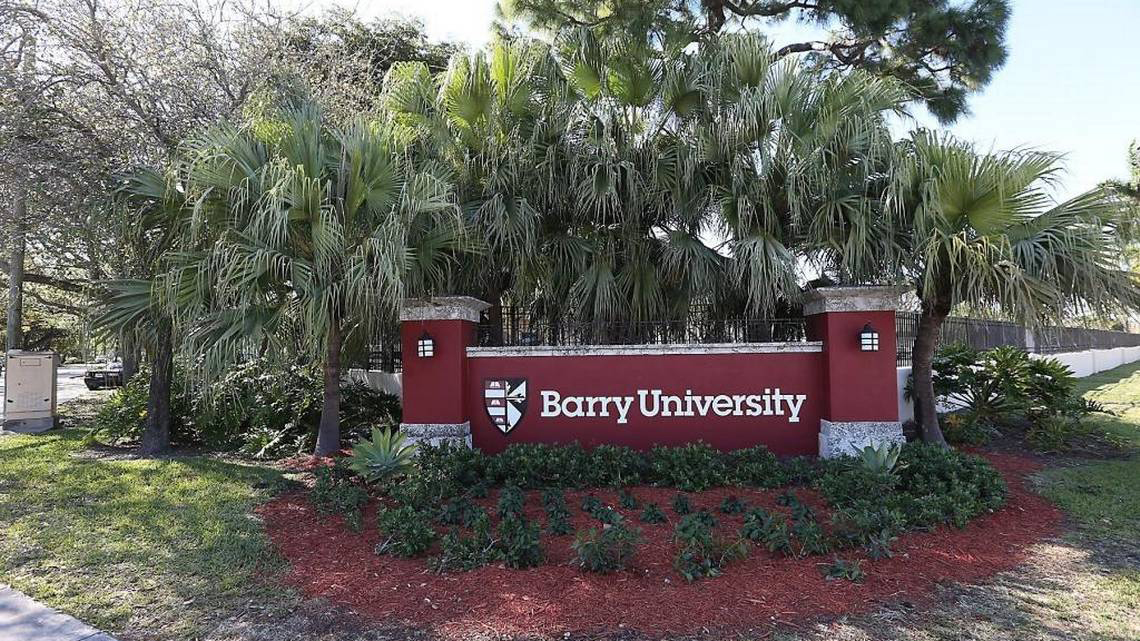
As part of the Strategic Plan for Community Engagement, the CCSI will adopt a place-based approach to community engagement within an “anchor institution” framework.
CCSI staff members discussed components of the new strategic plan at their retreat earlier this month. The three-day retreat took place on campus.
At the retreat, Dr. Victor Romano, associate provost for student success and undergraduate studies, thanked the CCSI staff for their “excellent work” over the years. He also expressed appreciation for their contributions to Barry’s standing in the community.
The CCSI’s mission is to foster civic engagement among students, faculty, and staff in the pursuit of social justice. By providing specialized programs, services, and resources, the CCSI supports community-engaged teaching and learning, research, and service.
Additionally, the CCSI functions as the coordinating unit for university–community partnerships.
Twenty-Six Faculty Members Have Won Barry Awards For Community Engagement
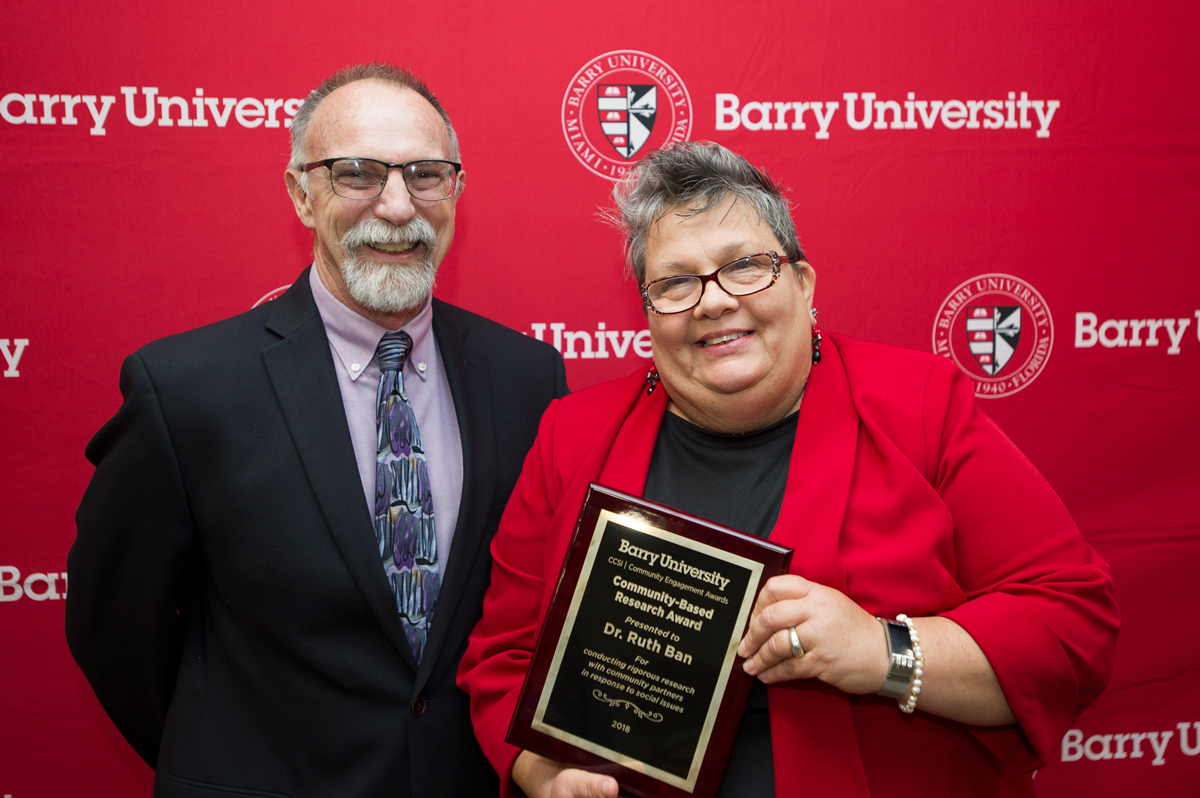
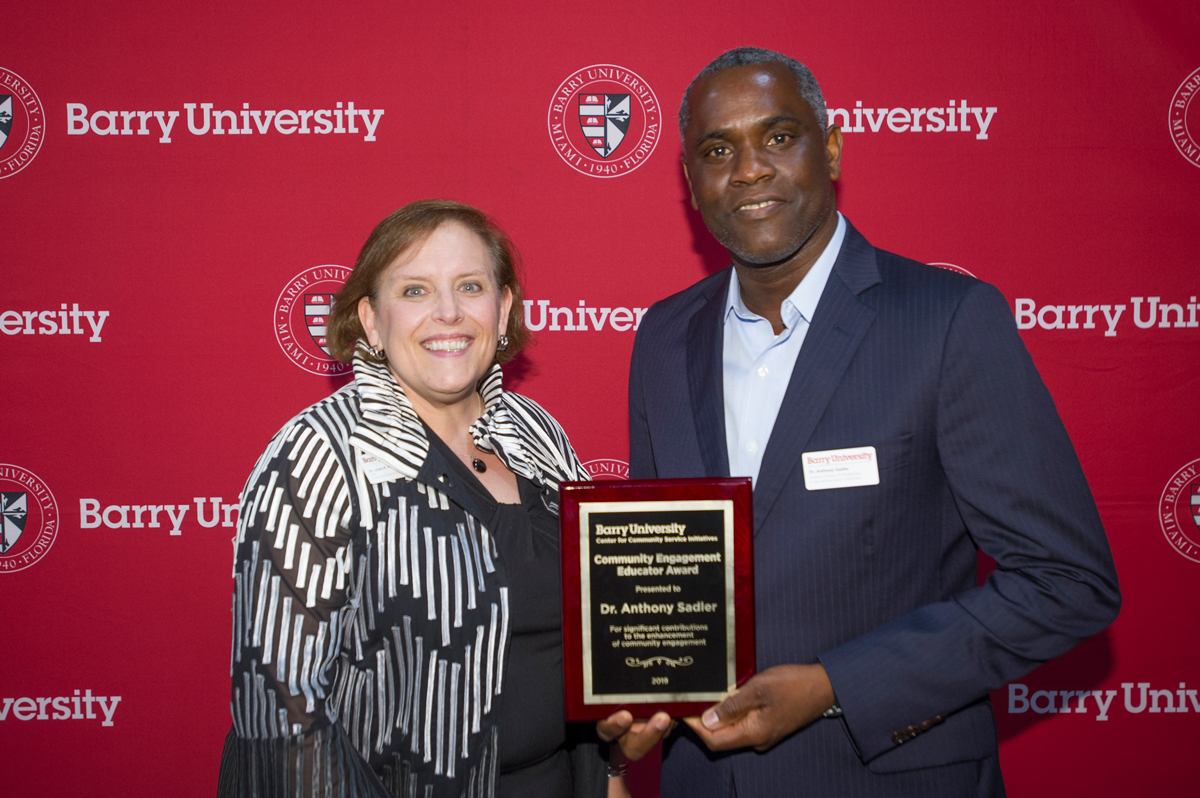
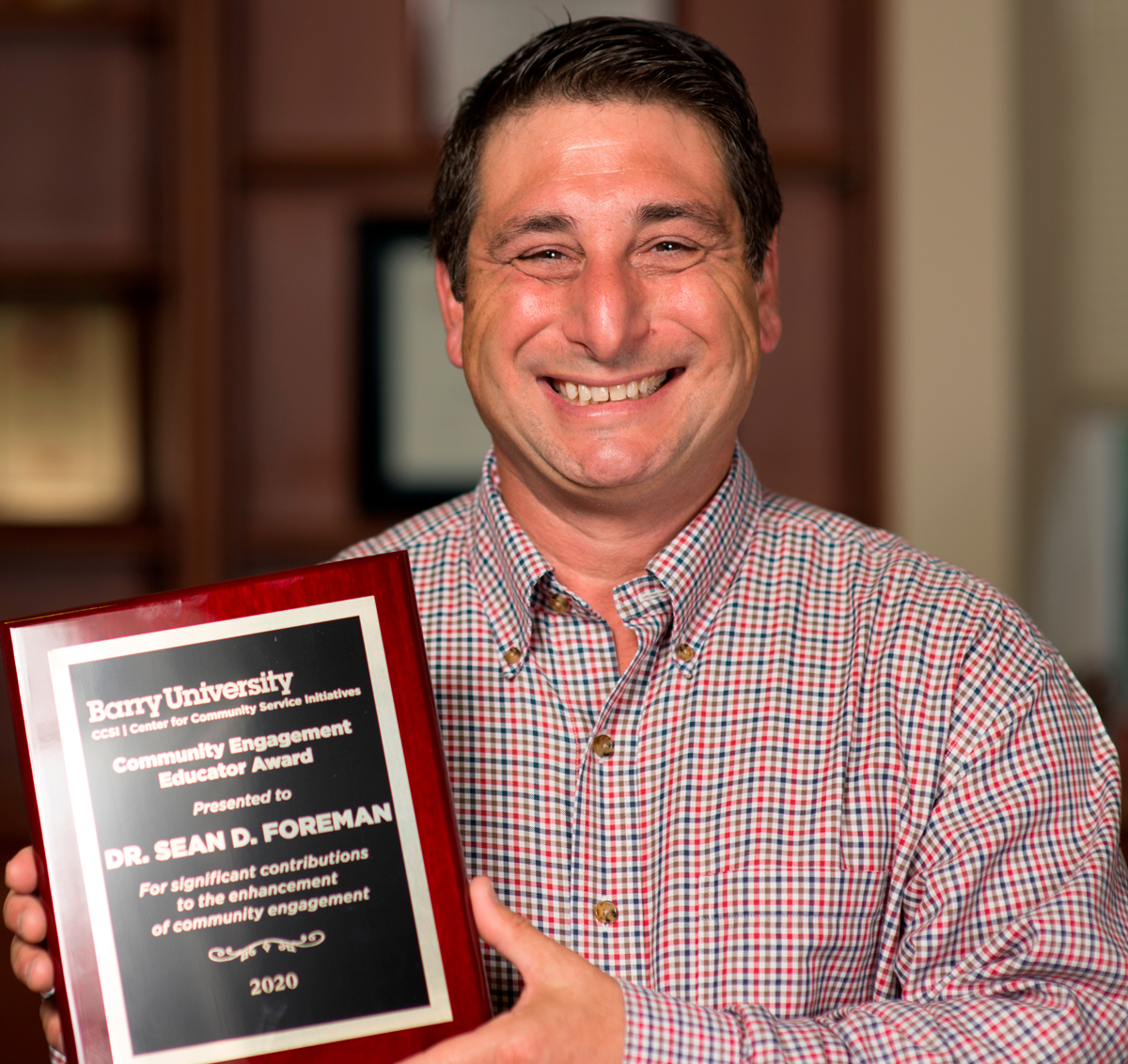
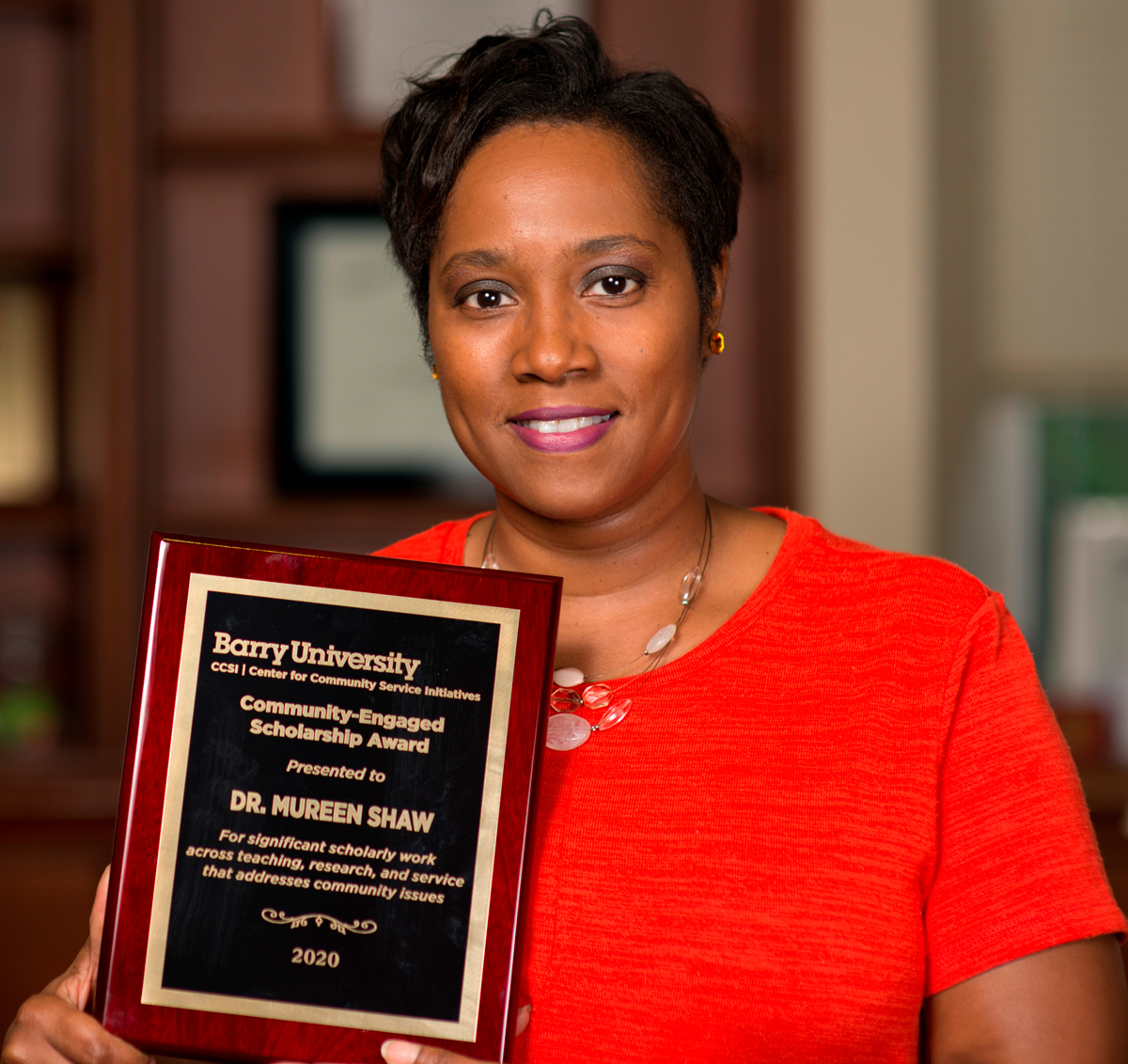
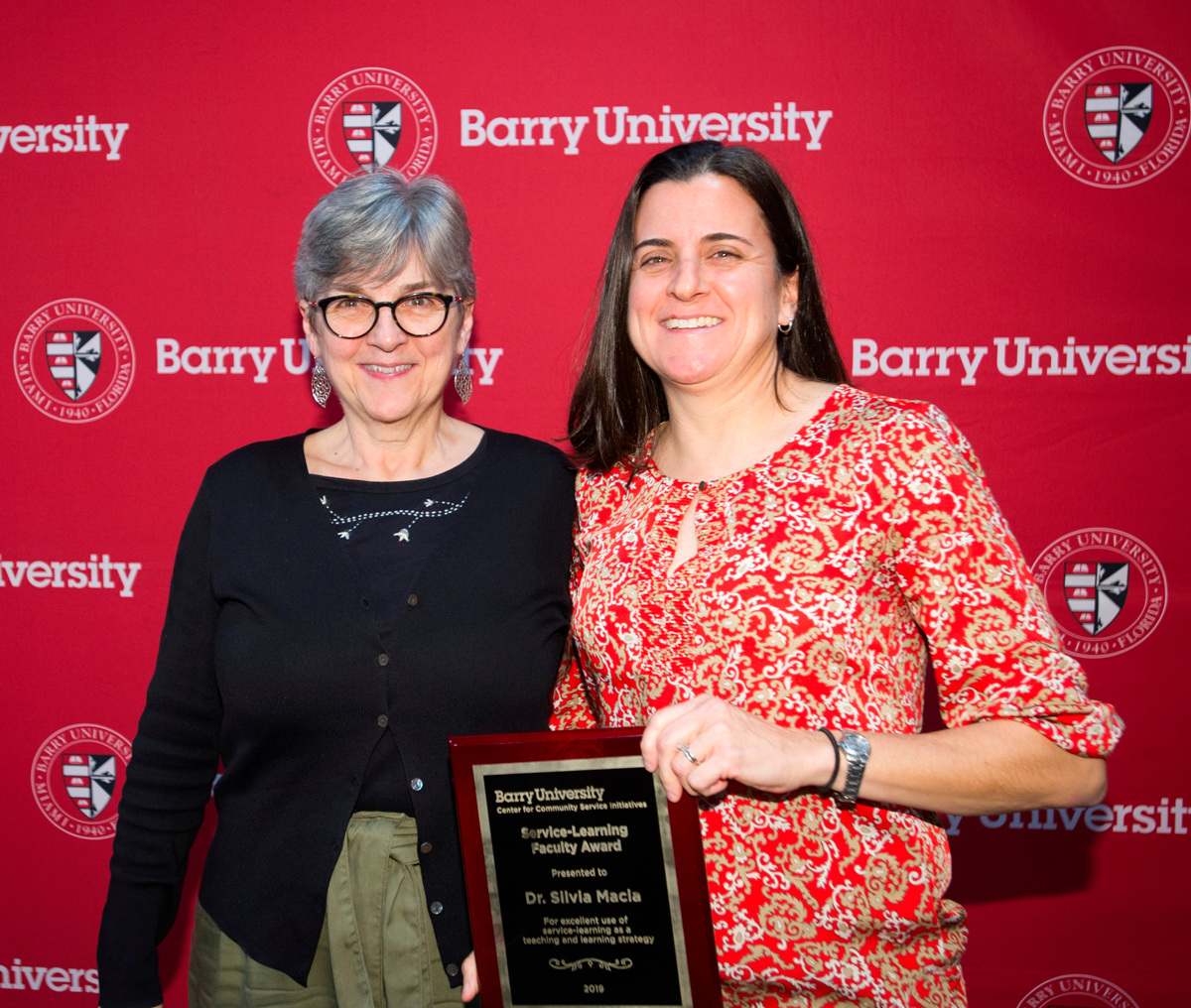
Faculty members who have won awards for community engagement include (from top, L–R): Dr. Ruth Ban, Dr. Anthony Sadler, Dr. Sean D. Foreman, Dr. Mureen Shaw, and Dr. Silvia Maciá.
During the first 10 years of the Center for Community Service Initiatives (CCSI), 26 faculty members won awards for community engagement. Two faculty members won awards in two categories.
Dr. Tamara Hamilton (College of Arts and Sciences) received the Service-Learning Faculty Award in March 2014, when the inaugural Community Engagement Awards took place.
Other faculty award winners for 2014 were Dr. Nauris Tamulevicius (School of Human Performance and Leisure Sciences) and Dr. Gerene Starratt (School of Education). Both received the Community-Based Research Award.
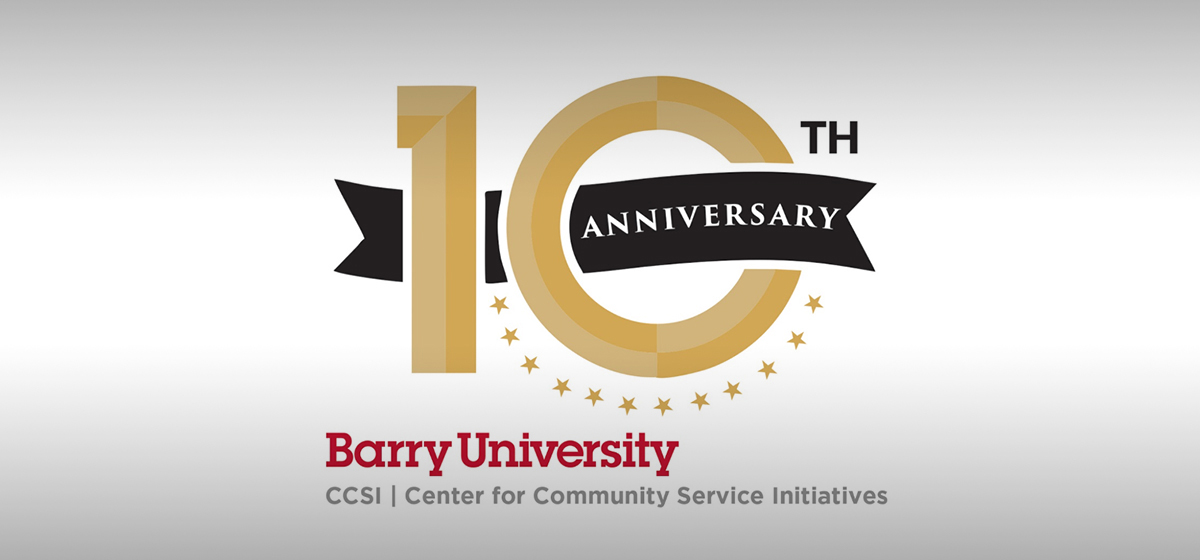
Community Engagement Educator
• Dr. Stephanie Bingham • Dr. Lilia DiBello • Dr. Sean D. Foreman • Dr. Ricardo Jimenez • Dr. Anthony Sadler • Dr. Marc Lavallee • Dr. Jalane Meloun
• Dr. Fabio Naranjo • Dr. Lauren Shure
Community-Based Research
• Dr. Ruth Ban • Dr. Lauren Shure • Dr. Gerene Starratt • Dr. Nauris Tamulevicius
Community-Engaged Scholarship
• Dr. Adam Dean • Dr. Laura Finley • Dr. Pamela Hall • Dr. Tisa McGhee • Dr. Mureen Shaw
Service-Learning Faculty
• Nicole Beltran • Dr. Paula Alexander-Delpech • Dr. Samuel Doss • Sister Mary Frances Fleischaker • Dr. Pamela Hall • Dr. Tamara Hamilton
• Dr. Kevin Kemerer • Dr. Raul Machuca • Dr. Silvia Maciá • Dr. Mitchell Rosenwald
Dr. Pamela Hall (College of Arts and Sciences) was the winner of the Engaged Scholarship Award in 2016 and the Service-Learning Faculty Award the following year. And Dr. Lauren Shure also won two awards—Community-Based Research in 2015 and Community Engagement Educator four years later, in 2019.
Community Engagement Educator, Community-Based Research, Community-Engaged Scholarship, and Service-Learning Faculty are four of seven categories of community engagement awards at Barry. The CCSI, which is marking its 10th anniversary this year, hosts the annual Community Engagement Awards.
Available Community Engagement Resources Include Literature On Experiential Learning
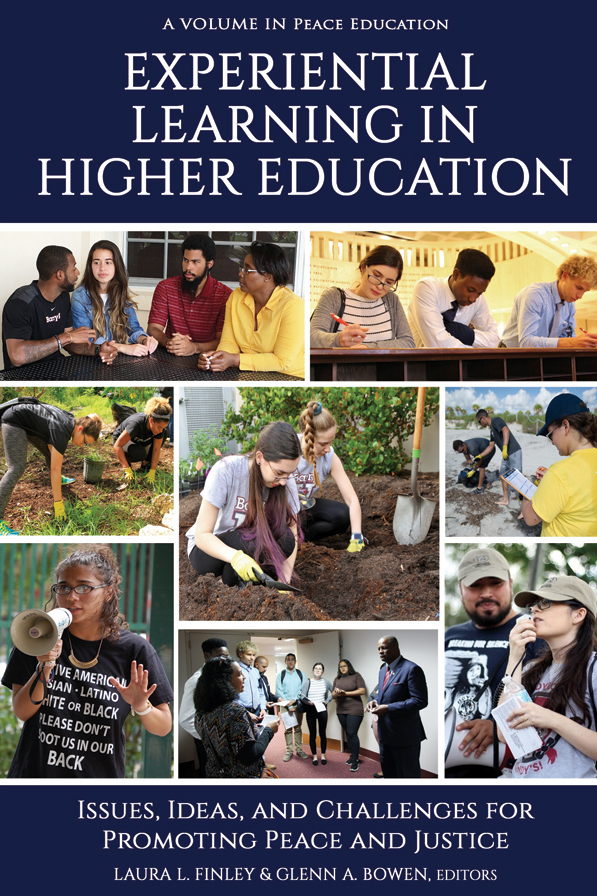
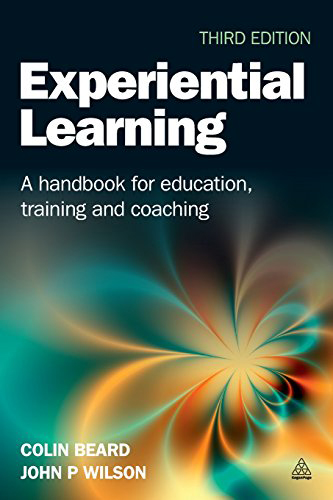
The CCSI Library includes books such as “Experiential Learning in Higher Education: Issues, Ideas, and Challenges for Promoting Peace and Justice” and “Experiential Learning: A Handbook for Education, Training and Coaching.”
The CCSI has assembled a variety of community engagement resources, which are available to both Barry campuses and community partners. Among the resources are literature—books, journal articles, and a fact sheet—on experiential learning.
Books include Experiential Learning in Higher Education: Issues, Ideas, and Challenges for Promoting Peace and Justice (Finley & Bowen, eds., 2021); Experiential Learning: A Handbook for Education, Training, and Coaching (Beard & Wilson, 2002); and Strengthening Experiential Education: A New Era (Hesser, 2014).
Articles include “Learning Styles and Learning Spaces: Enhancing Experiential Learning in Higher Education" (Kolb & Kolb, 2005) and "The Power of Experiential Education" (Eyler, 2009). Other examples of available experiential learning articles are listed below.
SELECTED JOURNAL ARTICLES ON EXPERIENTIAL LEARNING
“Developing an Experiential Learning Program: Milestones and Challenges” (Austin & Rust, 2015).
“Bringing Life to Learning: Immersive Experiential Learning Simulations for Online and Blended Courses” (Beckem & Watkins, 2012).
“Experiential Learning in the Scholarship of Teaching and Learning” (Benander, 2009).
“Experiential Learning Through Interactive Drama: An Alternative to Student Role Plays” (Boggs, Mickel, & Holtom, 2007).
“Experiential Education and Its Potential as a Vehicle for Social Change” (Breunig, 2005).
“Experiential Learning in Higher Education: Linking Classroom and Community” (Cantor, 1997).
“Experiential Learning: Exploring Its Long-Term Impact on Socially Responsible Behavior” (Caulfield, 2013).
“Promoting Student-Centered Learning in Experiential Education” (Estes, 2004).
“E-learning: The Next Wave of Experiential Learning” (Gold, 2001).
“Integration of Theory and Practice: Experiential Learning Theory and Nursing Education” (Lisko & O’Dell, 2010).
“Experiential Education Contributing to Language Learning” (Mollaei & Rahnama, 2012).
“Using Experiential Learning Theory to Promote Student Learning and Development” (Passarelli & Kolb, 2012).
“Traditional Lecture or Experiential Learning: Changing Student Attitudes” (Pugsley & Clayton, 2003).
“Lessons Learned From Experiential Learning: What Do Students Learn From a Practicum/Internship?” (Simons, Fehr, Blank, Connell, Georganas, Fernandez, & Peterson, 2012).
“Reflections on Experiential Teaching Methods: Linking the Classroom to Practice” (Wehbi, 2011).
Barry’s 2014 Quality Enhancement Plan is focused on personal and social responsibility pursued through experiential learning in the classroom, laboratories, and elsewhere on campus as well as in the wider community.
All community engagement (including experiential learning) books may be checked out for brief periods. Journal articles are distributed via email upon request.
For further information, contact the CCSI at service@barry.edu.
VOTER FRIENDLY CAMPUS: Barry University is likely to remain a Voter Friendly Campus for years to come, thanks to the outstanding contributions of the Campus Democracy Project.
COMMUNITY ENGAGEMENT AWARDS FOR STAFF: During the CCSI’s first 10 years, nine staff members have won awards for community engagement, presented by the CCSI on behalf of the university.
SERVICE-LEARNING FACULTY FELLOWS: Faculty members who have received service-learning fellowships have developed courses and demonstrated competence in community-engaged scholarship. Some of their scholarly work will be listed in a newsletter story next week.
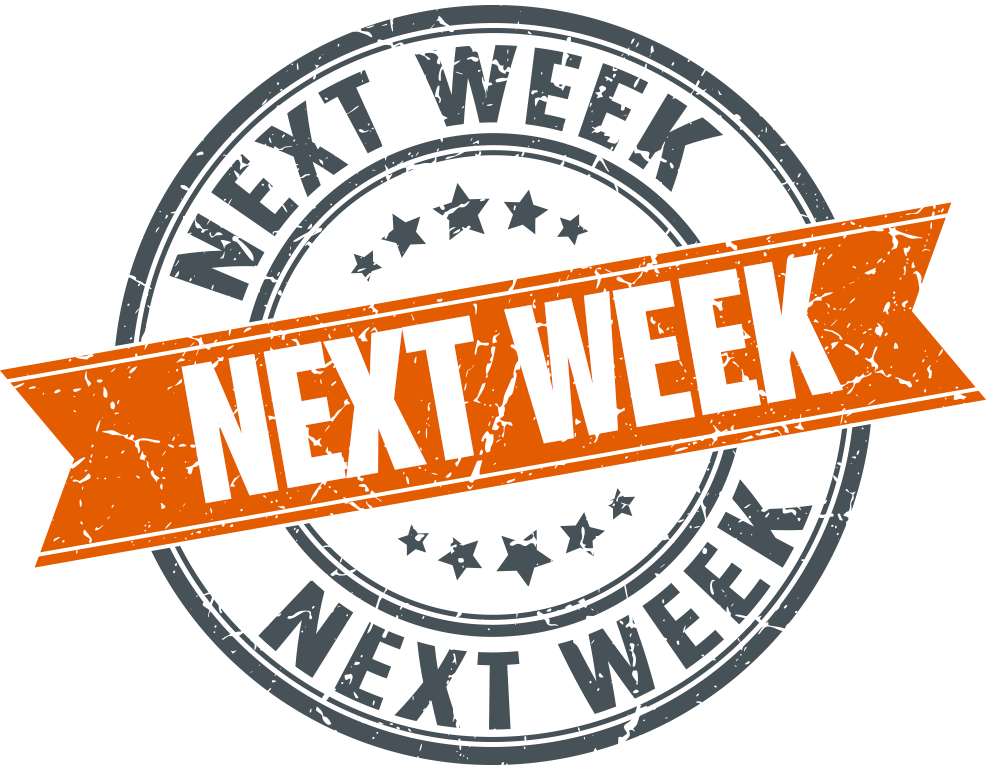
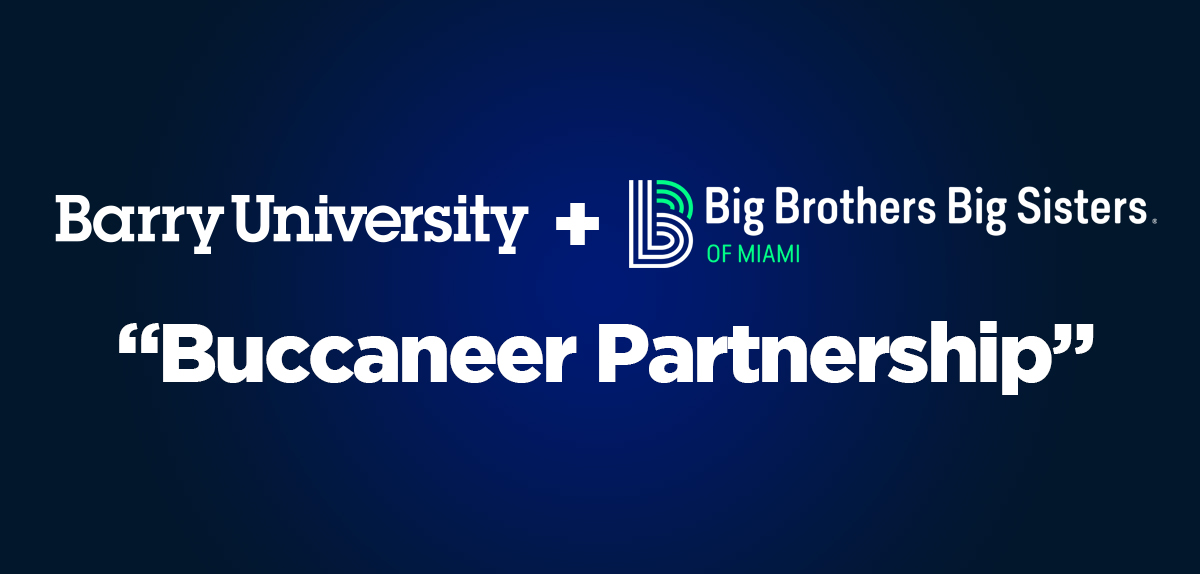
Apply to become a mentor (aka Big): https://bbbsmiami.org/volunteer/apply/
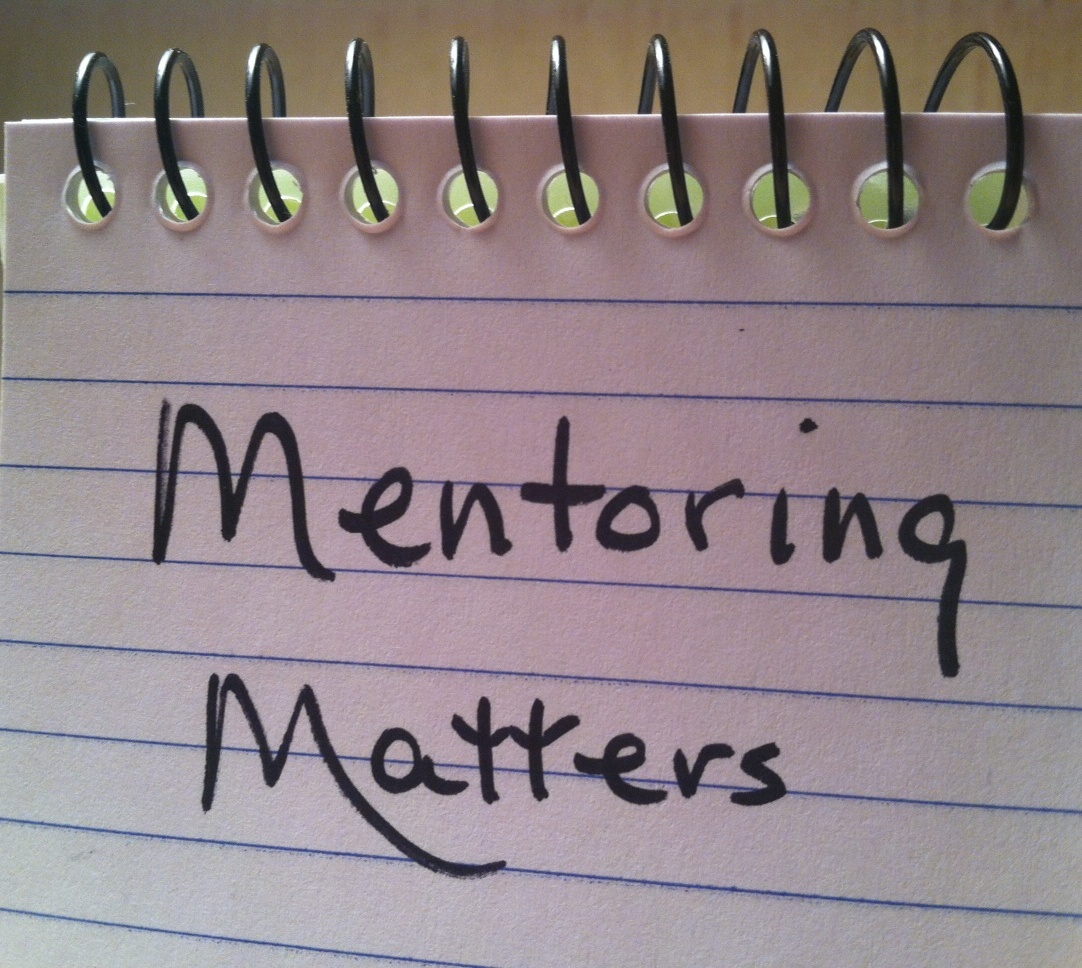

11300 NE 2nd Avenue
Adrian 208
Miami Shores, FL 33161

